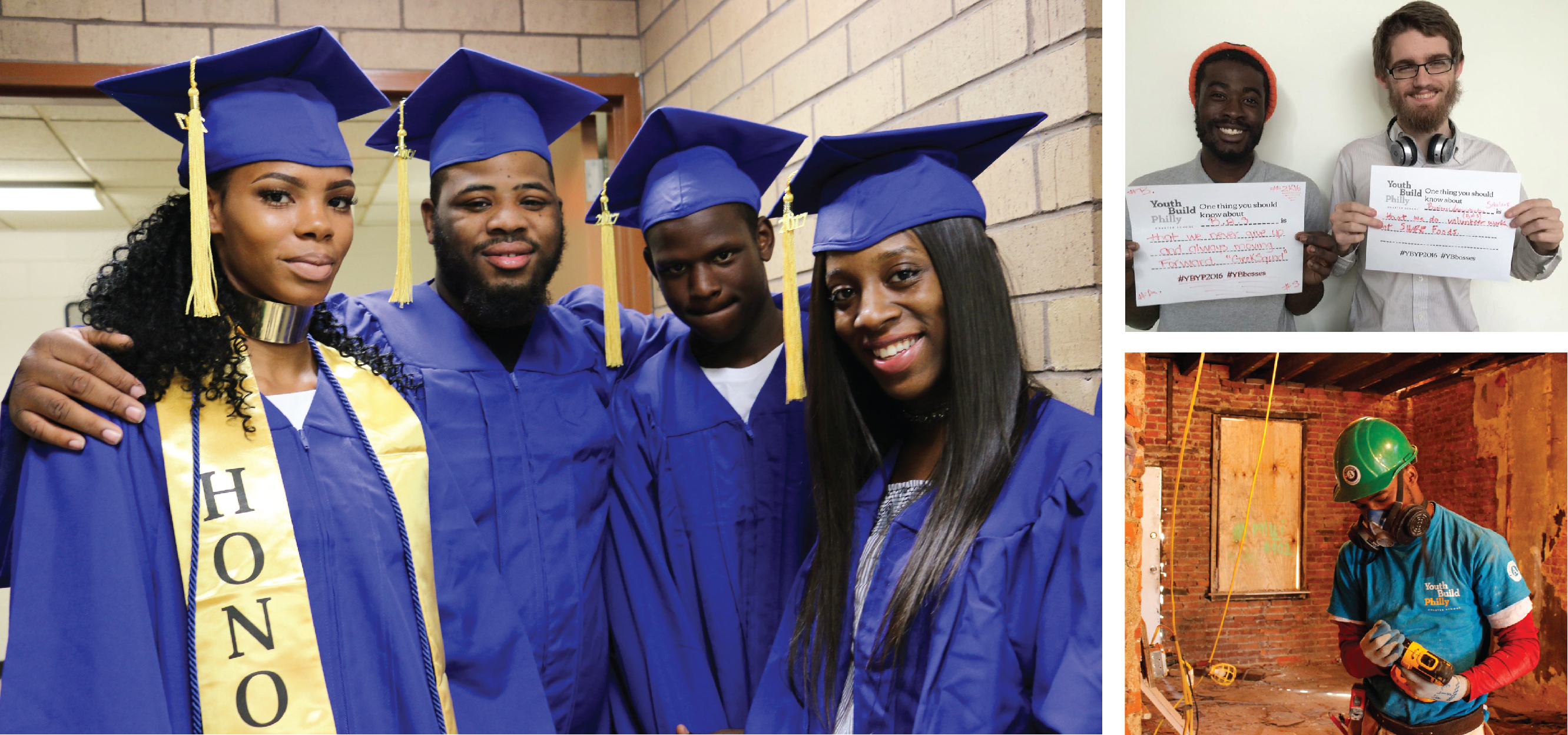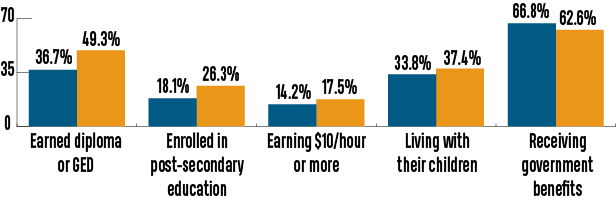NONPROFIT MAKING AN IMPACT

“I’ve been going through stuff, but I manage to show up and stay resilient, and I’m proud of that. The best piece of advice I’ve gotten at YouthBuild is that nothing is handed to you; you’ve got to put in the work. And when I think about my future, it makes me go at it more.”
-Andrea, YouthBuild Philadelphia graduate
WHAT IT DOES
Some 2.4 million young adults ages 16 to 24 have dropped out of school. YouthBuild offers a second chance to obtain a high school diploma, real-life work opportunities, and support to ensure that small hiccups don’t turn into insurmountable barriers. YouthBuild Philadelphia, part of the national YouthBuild network, operates the YouthBuild Philadelphia Charter School of the Philadelphia School District. Students completing the program earn a high school diploma (not a GED) in one year and certifications through employer partners in one of four areas: building trades, childcare, health care, or business administration/customer service. It also offers dual enrollment with the Community College of Philadelphia.
Whether or not they earn a degree, all students receive an additional year of YouthBuild services after they leave the school. Perhaps most importantly, YouthBuild staff members meet students where they are, helping with finding housing, applying for SNAP benefits, preparing for an interview, or talking through a conflict with a family member.
HOW EFFECTIVE IS IT
YouthBuild’s goal is to give students the opportunity to earn a high school diploma and help them move into postsecondary education or employment. Having a high school degree can add up to a large earnings differential over time. More than 70% of YouthBuild Philadelphia students graduate the program. Of those who graduate, more than 90% move on to fulltime employment or postsecondary education with over 75% retention one year later.
The program costs less than $30,000 per student over two years. CHIP used YouthBuild Philadelphia’s program results, along with its per student program costs, to estimate the cost for a student to complete the program and move into postsecondary education or employment. That program result costs approximately $47,000. Compare that to an estimated $623,000 in lifetime social welfare costs and lost income/tax revenue per high school dropout, to understand YouthBuild’s ‘bang for buck’: a savings of $13 for every $1 spent on the program.
Although YouthBuild Philadelphia has not undergone a standalone outside evaluation, the national YouthBuild organization began a rigorous evaluation in 2011. Interim findings were published in 2016. Nationally, after 2.5 years, the study found that YouthBuild participants are more likely to have earned their high school credentials and be employed at a higher salary than youth receiving other services. They are also less likely to rely on government services and more likely to live with their children.
LONG-TERM PAYOUT
Earning a high school diploma, as opposed to a GED, leads to higher income and employment rates later on.
| Average income, ages 30-60 |
Percent employed, ages 30-60 |
|
|---|---|---|
| Dropout | $15,604 | 79% |
| GED | $15,473 | 79% |
| High school diploma | $25,547 | 89% |
| Associate’s degree | $38,083 | 89% |
| Bachelor’s degree | $48,211 | 94% |
Source: National Longitudinal Survey of Youth 1997 (2015 data); www.nlsinfo.org/investigator/pages/login.jsp
BRIGHTER FUTURE
After 2.5 years in a national study, YouthBuild participants were more likely to experience multiple, positive outcomes compared to non-YouthBuild participants.
- Non-YouthBuild participants
- YouthBuild participants

Average weekly earnings: $134.50 vs. $150.20
Source: Miller et al. (2016); https://www.mdrc.org/publication/building-future
HOW YOU CAN HELP
Philanthropic contributions account for 30% of YouthBuild Philadelphia’s budget, with local, state, and federal government funds covering the rest. You can donate any amount directly through its website: $25 can provide needed classroom supplies, $50 can purchase worksite tools, and $250 can furnish a classroom. Philanthropy may be particularly important now because of proposed budget cuts to YouthBuild’s primary federal funder, the U.S. Department of Labor. YouthBuild Philadelphia also heavily relies on partnerships for its success. Donors can partner as an employer, or volunteer as a mentor or tutor.
YouthBuild national affiliates operate in urban, rural, and suburban locations across the country. Donors can give to YouthBuild USA or find a local affiliate. Funders interested in bolstering local efforts can provide financial support to increase career tracks or provide connections to local employers for training and employment in new fields.
RELATED POLICIES & PARTNERSHIPS YOU CAN SUPPORT
YouthBuild Philadelphia is a high school degree- granting charter school that receives district funding, a fact that is critical to program sustainability. Charter laws, in turn, are adopted at the state level, and differ from state to state. Donors interested in policy can support the adoption of charter laws that encourage alternative programming/recovery for youth who have dropped out of the mainstream school system.
Many U.S. school districts (about 64%) already have programs for students who have dropped out or are at risk of doing so. However, not all students have access to these programs: one-third of districts reported denying enrollment due to staff or space limitations. Donors can support expansion of programs directly or help districts partner with nonprofit charter schools. In doing so, it is important to check the evaluation data for these programs— and to make sure they are tracking students and collecting statistics on outcomes.
